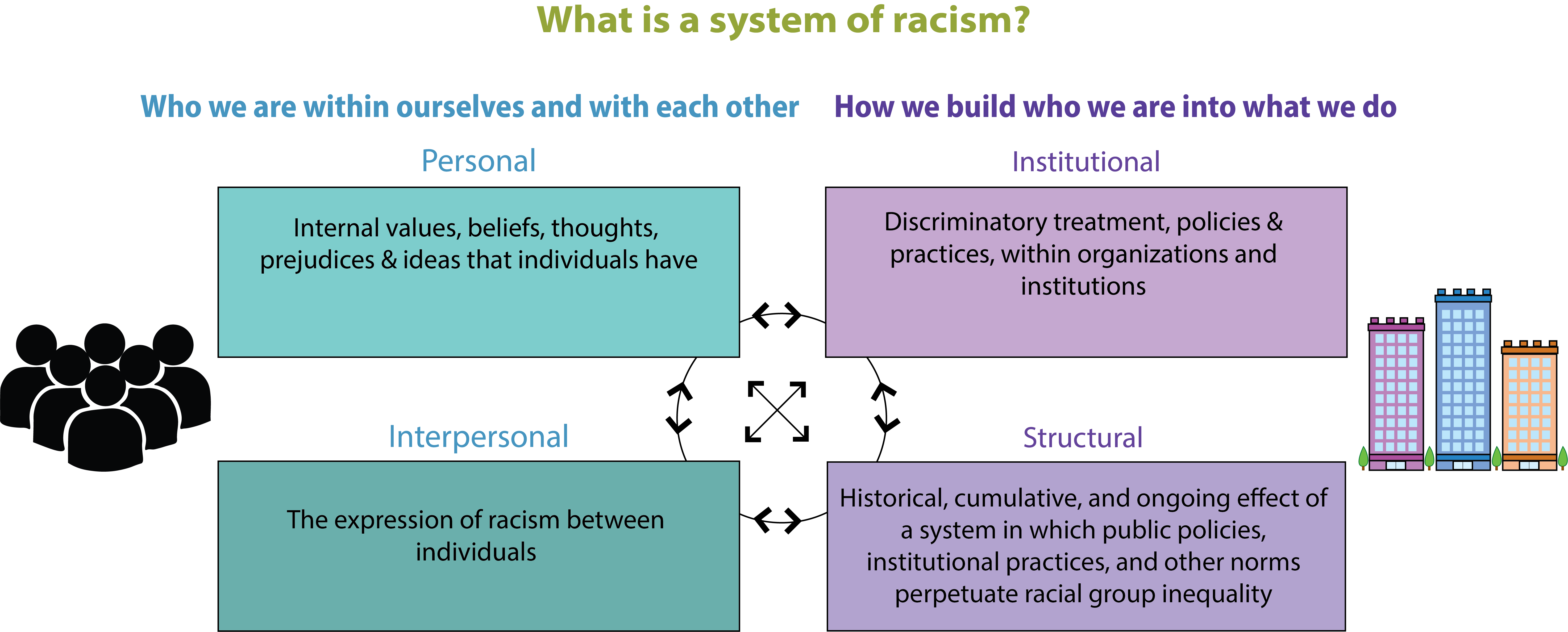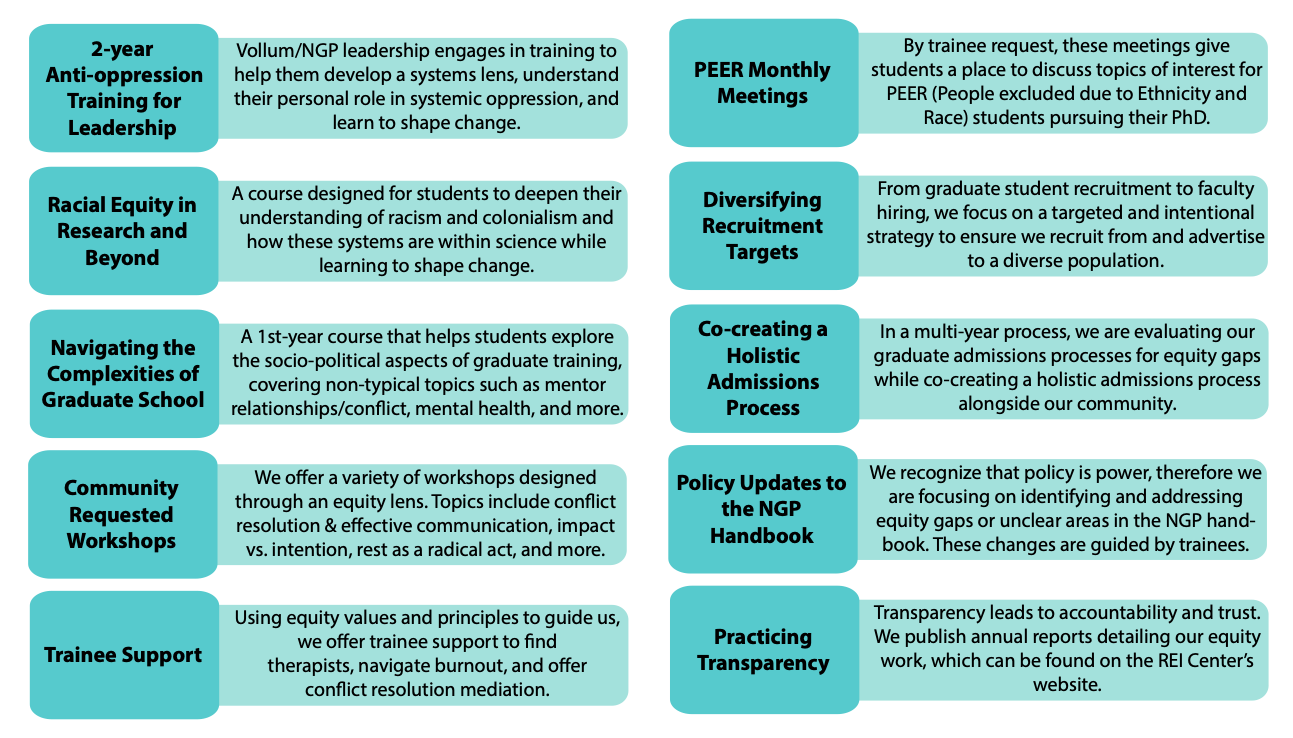Vollum/NGP’s Anti-Oppression Statement
At OHSU, we intend to establish ourselves as a national leading force in fostering an inclusive and safe environment where everyone can thrive and excel. In addition to our three missions to heal, teach, and discover, our fourth mission is to become a truly anti-racist and multicultural institution. The Vollum Institute and the Neuroscience Graduate Program (NGP) are in alignment with these missions; from innovative scientific discovery to training the next generation of critical thinkers, we aim to create an environment where every individual has the opportunity to reach their full potential.
As important as these core values are to creating a productive and supportive environment where everyone thrives, these values are oftentimes hopeful goals rather than the lived realities of many people across the scientific enterprise. Many groups remain underrepresented and excluded, explicitly or implicitly, from scientific research and education. These include women, individuals with physical or mental disabilities, those with social and economic disadvantages, and PEERs (Persons Excluded due to Ethnicity or Race)1,2.
The Vollum Institute and the NGP, in collaboration with the Racial Equity and Inclusion (REI) Center, aim to specifically determine and address the ways in which systemic racism (defined below) and other types of oppression show up in our scientific environment.
What are systems of oppression?
To understand why this underrepresentation exists, we can look at systems in our society that cause exclusion. A system is something that has many working parts that operate together to create a larger effect. When we are thinking of systems that exclude, we can think of systems of oppression. Systems of oppression use different working parts to create the larger effect of unfairly treating some groups poorly while other groups receive special/unfair advantages. Without concerted effort, people’s values, beliefs, and behaviors, as well as the rules around how organizations get things done, allow this difference in treatment to be perpetuated indefinitely3. Some examples of systems of oppression include but are not limited to systemic racism, patriarchy, ableism, classism, antisemitism, queer and trans antagonism, and the historical and current practice of colonialism. For a full definition of any of these terms, please visit the REI Center’s term glossary.
The four parts of the system
Each system of oppression uses the same four parts that create harm against specific groups of people. To describe these four parts, we will use systemic racism as an example (Figure 1). Systemic racism can be described as a system that creates an unfair advantage for white people while harming non-white people. The four parts are: 1) Personal racism (e.g., negative beliefs, attitudes, and biases about people of color that we have within ourselves); 2) Interpersonal racism (e.g., negative behaviors towards other people because they are people of color); 3) Institutional racism (e.g., unfair/discriminatory laws, policies, and practices that target or harm people of color inside of organizations or institutions); and 4) Structural racism (i.e., the accumulation of the historical and present day effects of personal, interpersonal, and institutional racism that causes continued inequities for people of color). To get a deeper understanding of systemic racism, please watch this video titled “Systemic Racism Explained,” which outlines some of the ways racism shows up in the U.S. including redlining in the housing market, differences in funding for education, and incarceration rates3.


Our goal is to create an anti-oppressive environment, which means we work on identifying and addressing the ways in which these systems of oppression show up in our scientific environment. We use two main approaches aimed to achieve an anti-oppressive environment in the Vollum Institute/NGP: 1) An anti-racist intersectional approach and 2) a systems lens approach.
The anti-racist intersectional approach
All systems of oppression are interconnected, which means the unfairness that one system creates supports the unfairness of other systems. Think of it like a strong chain-linked fence (Figure 2). Imagine that the fence is made of interconnected metal links, each representing a different system of oppression, such as racism, ableism, classism, etc. Each link depends on the other to make a strong barrier that keeps certain groups from their ability to live and thrive. If one of those links is strengthened or weakened, it affects the whole fence. Similarly, systems of oppression are interconnected, and strengthening or weakening each system affects the other.
For example, a person who is being treated unfairly because they have a low income and is both Indigenous and deaf, is likely affected by classism, systemic racism, colonialism, and ableism. Each of those systems work together to reinforce and deepen the unfair treatment and harm this person experiences, making it harder to live and thrive. Since our ultimate goal is to create a space where we remove all barriers so everyone can thrive, it is important to address each system in our environment and address the ways each system connects and supports one another.
Taking an anti-racist intersectional approach means that we use race as the center of our focus and consider the ways that the other systems of oppression interact with race and each other. This allows our focus and solutions to be both narrow and wide. For example, if we first focus on the wage gap between people of color and white people, while also examining the wage gap between women and men, then we would see that a pay disparity impacts people of color and women, and that there is a compounded wage disparity for women of color4. This approach allows us to attend to racism, sexism, and classism individually, while also focusing on the unique ways that these systems intersect.
A systems lens approach
As mentioned before, systems of oppression have four working parts: Personal, Interpersonal, Institutional, and Structural. With that understanding, the work and positions of the REI Center are structured to attend to each part of the system.
The REI Center has two leadership positions focused on all parts of a system of oppression:

The Director of Community Transformation focuses on addressing personal and interpersonal aspects of systemic racism/oppression (Figure 3). Their role involves identifying cultural values incompatible with equity while developing actions to align values and norms for an inclusive environment. They provide anti-racism/anti-oppression education to students, postdocs, and faculty, while helping people understand how certain personal beliefs and behaviors contribute to systemic issues. By transforming the culture, they aim to create an equitable space.
The Director of Innovative Policy focuses on institutional and structural forms of systemic oppression (Figure 3). They are responsible for identifying inequitable policies and procedures within the Vollum/NGP and creating and implementing policies that promote equity. This position focuses on reviewing and updating policies that affect how the Vollum and NGP recruits and retains faculty, students, post-docs, and other research staff.
Figure 4 gives a brief overview of our current efforts. We continue to expand and/or build on these efforts daily and plan to engage in new efforts over time.

Advancing racial equity and anti-oppression benefits everyone and it is our entire community’s responsibility to advance racial equity and anti-oppression. Our overall aim is to empower our leadership and our community members to become active agents of change in order to truly live our values and manifest our missions at OHSU.
We see these objectives as only the beginning steps of our anti-racism/anti-oppression work. This work involves continual assessment, (re)evaluation, and ongoing openness to change and improve. We are committed to transforming our environment so that it may truly reflect our values and create a thriving, inclusive, anti-racist, and multi-cultural institution.
In-text references:
- Populations Underrepresented in the Extramural Scientific Workforce
- Race Matters
- Social Identities and Systems of Oppression | National Museum of African American History and Culture
- Gender wage gap widens even as low-wage workers see strong gains: Women are paid roughly 22% less than men on average